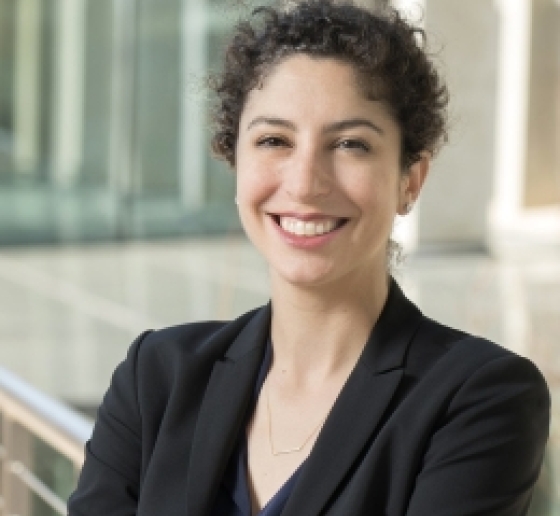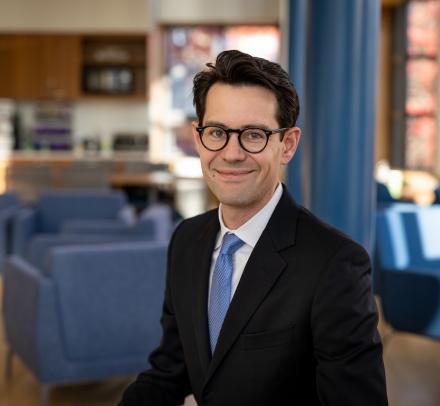Rebecca Wexler: Investigating How Technology Impacts the Criminal Legal System
The expert on evidence joins the Columbia Law School faculty as a professor of law.

Before Rebecca Wexler attended law school, she spent seven years as a documentary filmmaker, working as a researcher and associate producer on PBS documentaries and directing educational films for a regional theater. She shot a film in Guinea for a museum installation and traveled to Sri Lanka as a Fulbright scholar to work with postwar filmmakers in the Tamil region.
“It was fascinating work. I met all sorts of people, and I learned about storytelling,” she says.
When Yale Law School hired her to teach documentary filmmaking to students in its Visual Law Project, Wexler was impressed by the students, who wanted to expose injustices through film. “They worked on a film about stop and frisk and about deporting noncitizen veterans,” she says. “It was much more impassioned and meaningful than what I had been doing. I thought, ‘I want to do work like that.’ It was a completely transformative experience.”
So Wexler applied to and was accepted at Yale Law School, where the course that excited her most as a 1L was Evidence. “I’ve long been interested in truth, representation, and knowledge production,” says Wexler, who studied the history of science and technology as an undergraduate at Harvard and earned a Master of Philosophy from the University of Cambridge, where she was a Gates Cambridge Scholar. “I’ve been interested in philosophical debates about objectivity. When I thought about where these questions would appear in the law, I realized they would appear in Evidence. And on my first day of class, I went up to my professor and told him I wanted to be an Evidence professor, too.”
Evidentiary “Privileges”
At Columbia Law, Wexler, who joins the faculty as a professor of law on July 1, will teach a Law and Technology seminar, as well as the upper-year Evidence course. Her scholarship focuses on data, technology, and secrecy in the criminal legal system. She has written articles about these topics, which have been published or are forthcoming in the Harvard Law Review, Stanford Law Review, and Michigan Law Review, among other leading academic journals. Wexler has also published op-eds on the themes of her scholarship in The New York Times, Los Angeles Times, Washington Monthly, and Slate.
One of the primary concerns in both her scholarship and her Evidence class is the role of “privileges” in criminal cases. “Privileges are rules that let people withhold evidence or keep things secret,” she says. “So beyond your attorney-client or your spousal privileges, you have trade secret privileges for intellectual property. You have national security privileges, police privileges for surveillance technologies, and I spend more time on those in class than other professors would.”
Wexler believes these types of privileges can have a deleterious effect on the application of justice. “Most rules of evidence at least have the appearance of truth-seeking. There’s some kind of rationale that we let in this and not that because we want accurate decisions. But privileges keep things secret and make decisions less accurate,” she says. “Privileges cause injustice. Innocent people suffer. Plaintiffs don’t get their due. And we’re OK with that because the secrets matter more. I think that’s fascinating: why we make that choice as a society and who gets to make the choice and who gets to benefit.”
One of her earliest articles on privileges, “Life, Liberty, and Trade Secrets: Intellectual Property in the Criminal Justice System,” examines how tech developers often claim that details about how their tools work are privileged trade secrets and refuse to disclose that information to criminal defendants and their lawyers; she argues that “a criminal trade secret privilege is ahistorical, harmful to defendants, and unnecessary to protect the interests of the secret holder.”
Wexler approached the issue of privilege from another angle in a UCLA Law Review article that introduced the phenomenon of “privacy asymmetries,” which she defines as privacy statutes that allow courts to order disclosure of sensitive information when requested by law enforcement but not when requested by a criminal defense counsel. “Therefore, statutes that selectively suppress defense investigations selectively suppress evidence of innocence,” she wrote. Wexler’s policy suggestion: Legislators drafting privacy statutes must make sure that the laws they pass are symmetrical for law enforcement and defense investigators.
The Road to Academia
After graduating from law school, Wexler spent a year as a public interest fellow at The Legal Aid Society in its criminal defense practice area. “Working at Legal Aid with extremely smart, well-trained, and inspiring attorneys was a deeply formative experience,” she says. “They were devoting themselves to using their skills to protect people who had no other shield against potential wrongful convictions or extremely onerous and unjust sentences. For better or worse, there are unfortunately so many things wrong with our criminal legal system that it’s full of opportunities for improvement, so it seemed like a space where I could be useful.” While at Legal Aid, Wexler wrote an op-ed, “When a Computer Program Keeps You in Jail,” for The New York Times, foreshadowing her academic scholarship.
Wexler then clerked in the U.S. Court of Appeals for the 2nd Circuit and the U.S. District Court for the Southern District of New York. “Appellate clerkships are the more traditional academic route, but I wanted to be an evidence professor, so I thought I should spend time working in a trial court,” she says. “The district court was hard work, and we worked long hours. I had three meals a day at my desk for a year.”
In 2019, Wexler joined the faculty of University of California, Berkeley, School of Law, where she taught Evidence for six years and became a faculty co-director of its Center for Law and Technology (and later a faculty co-director of its Center for Criminal Law and Justice). In January 2023, she took a government service leave to work as a senior policy advisor in the White House Office of Science and Technology Policy, where she helped implement President Joe Biden’s Executive Order on Advancing Effective, Accountable Policing and Criminal Justice Practices to Enhance Public Trust and Public Safety. “It was an opportunity to put some of the ideas I’d been working on in scholarship into practice, particularly around criminal defendants’ access to information about surveillance and forensic technologies,” she says. Although President Donald Trump revoked the EO on his first day in office, Wexler says that the reports she worked on—which discussed discovery, face recognition, and body-worn cameras and recordings—remain publicly available.
In fall 2023, Wexler spent a semester at Columbia Law as a visiting professor; she is elated to now be a member of the full-time faculty. “Columbia has so many of the leading thinkers in legal academia today, people like Dan Richman working in criminal law and Dave Pozen, who has been a hero of mine for his work on transparency,” she says. “It’s a place with so much scholarly excellence and excellent students.”
Wexler says she is also thrilled to move back to New York City (where she lived from 2006 to 2012 and from 2016 to 2019) with her partner, Bryan Pardo, a professor of computer science at Northwestern University, and their two-year-old son. “We’re going to live in West Harlem, and Bryan, who is a performing musician, is excited that we will be within walking distance of Minton’s jazz club, the birthplace of bebop,” she says. “I’m looking forward to all the cultural opportunities in New York and reconnecting with my colleagues from The Legal Aid Society, who continue to inspire me. Two of them came to speak to my Evidence class when I was a visiting professor here, and I am planning to invite them back.”
For Wexler, her scholarship and teaching have never seemed more urgent. “In this moment,” she says, “it’s more important than ever to protect the rights of people who are accused by the government.”
